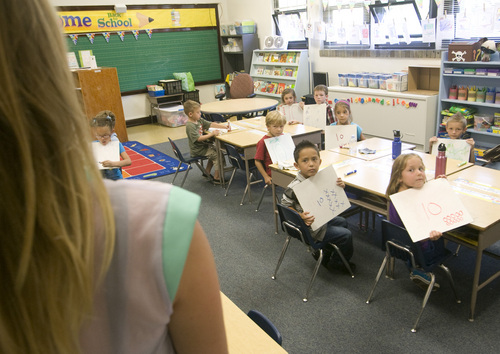This is an archived article that was published on sltrib.com in 2013, and information in the article may be outdated. It is provided only for personal research purposes and may not be reprinted.
No one — parents, educators, the governor, legislators — likes that Utah now has two systems trying to hold schools accountable: new school grades and their predecessor, the Utah Comprehensive Accountability System (UCAS).
But combining them — once seen as a possibility — appears increasingly unlikely.
Senate President Wayne Niederhauser, R-Sandy, says he expects the Legislature to "sand the rough edges" of the new law, but he won't back away from assigning letter grades to schools. Gov. Gary Herbert is floating the idea of a grade-point average instead.
And State Board of Education member Tami Pyfer of Logan wants to give UCAS a makeover or start fresh.
She envisions taking into account much more of what happens within schools, including arts and Advanced Placement classes.
"There's a whole menu of options available to us for a great, dynamic system," she says.
—
'Move the needle' • The Utah Office of Education's releases school grades in early September and UCAS results this week have led to confusion and consternation.
While the new approach assigns a letter grade to each school, UCAS juxtaposes a point score against the state average. Both are chiefly based on Criterion Referenced Tests (CRTs) on math, language arts and science.
Niederhauser says school grades have given greater clarity than ever to what's happening in schools and have ignited a public conversation. The Legislature and educators are finally hearing, he says, how some schools overcome income and other demographic barriers to perform well.
The principals of nine such schools spoke at a legislative education task force meeting last week, testimony Niederhauser says would not have been possible without school grades.
"This conversation will move the needle," he told them.
But Deon Turley, education commissioner for the Utah PTA, says school grades do not tell parents some of the most important information: a school's culture. Are people in the school kind to students? Is bullying tolerated?
"I haven't met anyone who says, 'Wow,' that [single grade] tells me a lot,' " says Turley.
Patti Harrington, executive director of the Utah School Superintendents Association, says school grades are bad law and bad policy.
"You could have put out the grades by ZIP code," she says, referring to the fact that schools in poorer, minority neighborhoods generally got worse grades.
But UCAS also doesn't clearly help schools identify what to improve, Harrington said.
—
Make 'raspberry lemonade' • The governor wants to go in a new direction, says outgoing Lt. Gov. Greg Bell.
A single grade does not reflect the "moving parts" in a school, and UCAS reports, perhaps good for educational leaders, are "not much of a consumer tool," Bell says.
Measurements of a school's success or failure should be comprised of more than test scores and graduation rates, he says. "The governor's idea is to make that a lot more nuanced and come up with a good template, like a GPA."
Scores might include minority graduation rates, International Baccalaureate, Advanced Placement and ACT scores, parental satisfaction, and teacher-certification levels. (School grades are already set to add ACT scores in next year's grades.)
Harrington suggests an accountability system could be modeled on the existing school improvement plans, with community councils responsible for measuring and crafting performance solutions for their own schools.
Pyfer believes the education board is off the hook to keep UCAS as the state's accountability system, since the Legislature is committed to school grades. (The federal Department of Education has approved UCAS as part of a waiver from using a No Child Left Behind accountability system.)
The way she sees it, the school-grades law supplanted Niederhauser's 2011 legislation that led to the creation of UCAS.
"We made lemonade out of lemons," Pyfer says, "but maybe we could have raspberry lemonade of our own design and recipe."
—
Changes ahead • The debate is complicated by the fact that next spring, students will no longer take CRTs, the baseline for both systems. The state is moving to computer adaptive tests, which the Legislature approved.
"That's one of the reasons we kept saying, 'Let's delay,' " during the past legislative session, Harrington says.
Among the "tweaks" to school grades that Niederhauser wants to see are to drop the automatic F for any school with less than 95 percent participation on end-of-year tests. The penalty should be one letter grade, he says.
Both West High in Salt Lake City and Viewmont High in Bountiful earned F's because of the requirement. West would have had a D, but Viewmont would have had a B.
The Senate president also would make adjustments for alternative schools, which educate students at risk of dropping out. Those high schools dominated the bottom of the school grades list, with most earning F's.
Niederhauser said the system also needs to be implemented differently so it doesn't require schools to fall along a bell curve, with some necessarily getting F's.
That has been one of the most controversial pieces of school grades.
"That," he says, "was not our intent."
Twitter: @KristenMoulton —
Find your school's grade and score
O Go to the state's education office data website to explore both accountability systems. > bit.ly/datagateway
Search for a school by name, then choose either School Grade or Utah Comprehensive Accountability System report. To see spreadsheets with all schools' scores, go to the office's accountability site. > bit.ly/ucasreport







